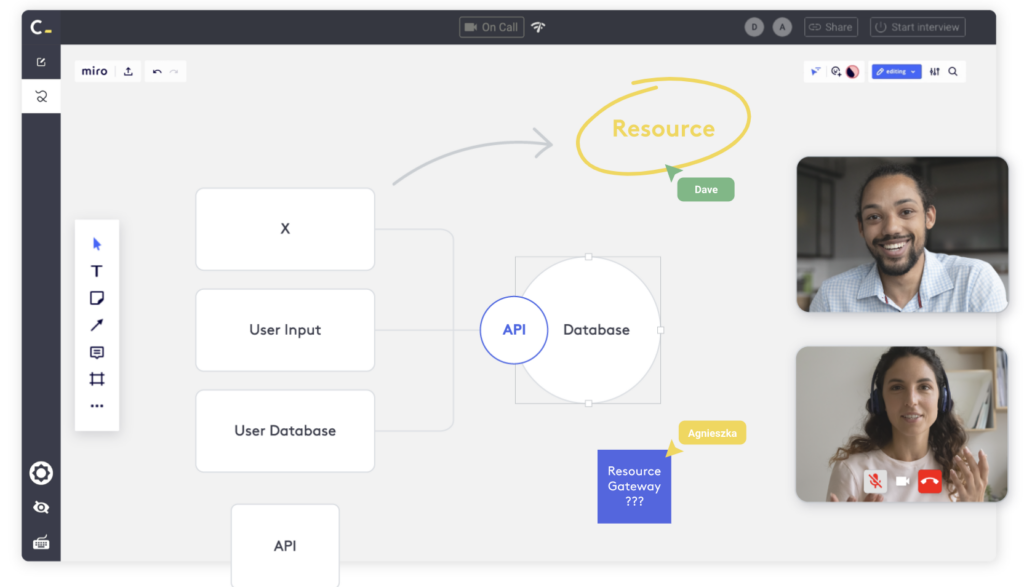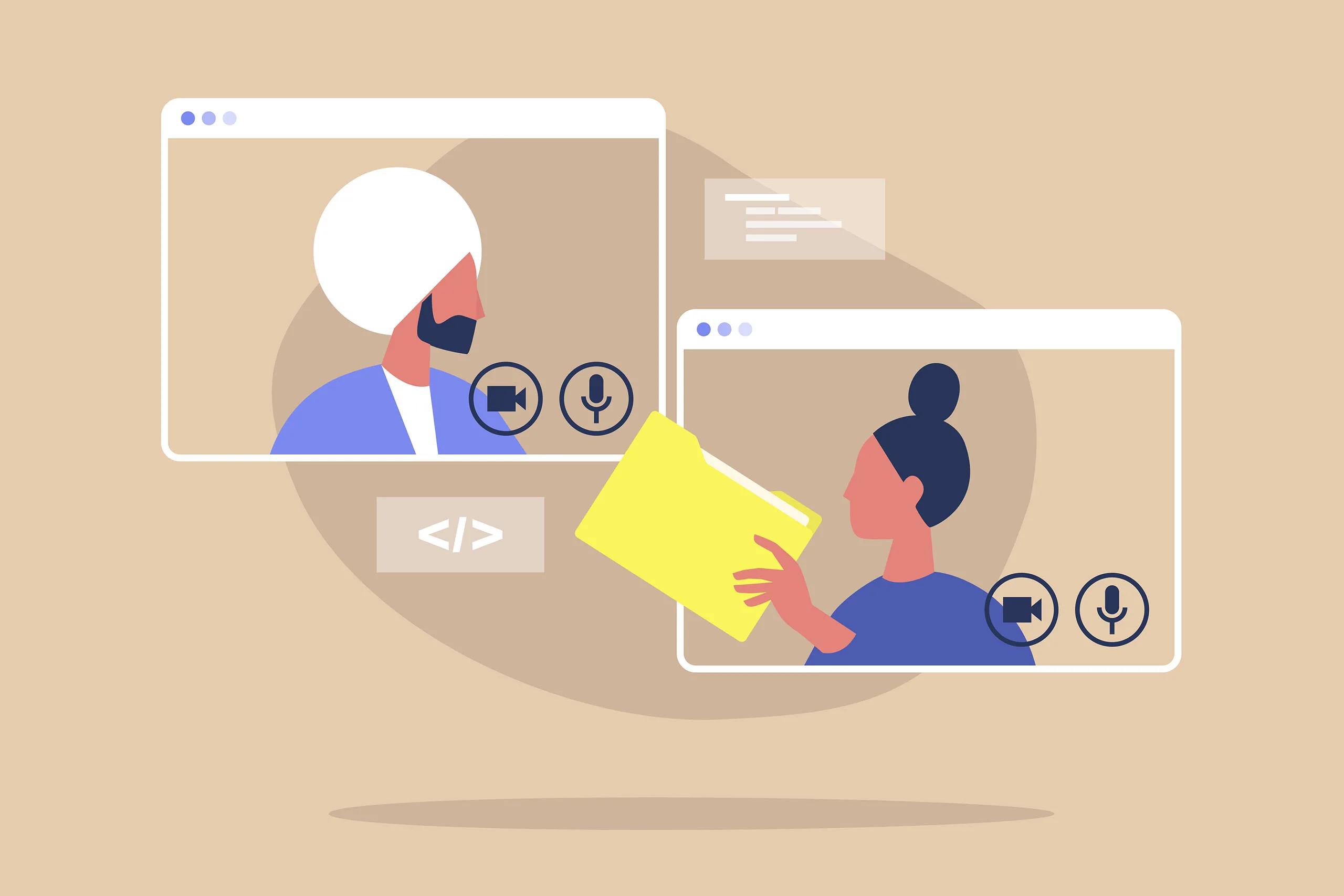Be the first to know
Sign up for a weekly dose of tech hiring news and updates.
Whiteboard coding interviews are an excellent way for recruiters to assess your technical expertise and communication skills to determine how well you fit the job and existing teams.
Although whiteboard interviews can be more difficult for some than others, the good news is that you can prepare to feel more confident and competent. To that end, we’ve put together six tips in this blog post to help you prepare for your next virtual coding interview.
Tip #1: Practice thinking out loud
Of course, recruiters want to test your technical and creative skills when they give you programming tasks. But they also want to understand how you approach a problem and how you arrive at a solution.
That’s why it’s essential to learn how to express your thoughts aloud in an understandable way. A skilled interviewer will also ask you questions to get you talking – take this chance to give them insight into how you work and think.
Thinking aloud is a skill you can practice yourself – even if it may feel strange at first. To do this, solve a programming task and comment on what you do and think. Also, imagine what questions you might get and answer them, for example:
- What do you think is the problem?
- Where do you see possible edge cases?
- What solutions can you think of?
- What are the benefits of one solution over another?
You might also like: Interview Questions for Senior Software Engineers
Tip #2: Hone your communication skills
In a virtual whiteboard interview, the recruiter wants to know how you handle complex technical issues, whether you are open to feedback, and how you communicate and request input to find a workable solution.
Ultimately, this helps them assess how well you fit into their teams and whether you’d work well with other engineers and non-technical colleagues.
Having good communication skills is always an advantage, and you can always sharpen them:
- Take it slow. Practice speaking thoughtfully and without rushing. Carefully read tutorials and watch videos to learn how others explain technical topics.
- Practice asking questions. If you get stuck or something is unclear, don’t hesitate to ask. Think about questions you could ask in the interview to get to a better solution.
- Ask for feedback frequently. What do the interviewers think of your approach? Do they have suggestions about your pseudocode? Find appropriate situations during an interview to ask for feedback. You can also ask friends and family for input on everyday things to practice.
Want tech hiring insights straight to your inbox? Sign up for our newsletter here!
Tip #3: Keep your technical skills in shape
Of course, you need to master your craft to conduct a successful whiteboard coding interview. But what should you practice?
First of all, you should know that interviewers don’t usually test you to see if you know a particular algorithm or data structure by heart. Instead, they care about your problem-solving skills. And that’s why you need to think aloud when solving problems – because even if your whiteboard solution is not ideal, it’s often not a problem if recruiters understand how and why you came up with it.
Nevertheless, you should revisit some basic algorithms, data structures, and Big-O notation. These can give you new ideas for solving programming questions and help you find high-performing solutions.
Practice solving programming problems using different approaches to improve your problem-solving skills and deepen your knowledge of algorithms and co.

Tip #4: Learn about virtual whiteboard interview tools
Before the interview, find out what tools the recruiters will be using. This way, you can familiarize yourself with the environment in which the virtual whiteboard interview will take place and better prepare yourself for what to expect.
Some recruiters conduct their virtual whiteboard interviews via video chat platforms like Google Meet or Zoom, along with an online whiteboard to sketch out solutions. Sometimes you’ll also work in a shared IDE with recruiters to write code on the fly.
Many companies use dedicated tools for virtual whiteboard coding interviews, such as CodeLive, which offers a whiteboard, video conferencing, and a shared IDE. You can read our FAQs for candidates and documentation for recruiters to learn more about the tool’s features and how you will work in it.
Extra Reading: Whiteboard Interviews: Why They’re Bad For Technical Interviewing
Tip #5: Get outside support
If you’re not sure how to practice or feel like you’re stuck, seek outside help and knowledge:
- Ask a friend to conduct a test interview with you and get their feedback.
- Try to see an actual virtual whiteboard coding interview.
- Sharpen your communication skills in conversations with friends and family.
- Find and consume instructional videos, blog posts, and guides on the Internet.
- Buy or borrow books on the subject.
- Participate in fun coding challenges
Tip #6: Keep practicing
To prepare well for a virtual whiteboard interview, you should take a closer look at all the tips from this blog post. However, if you feel that you have shortcomings in a particular area, your focus should be on improving that.
For example, if you feel like you haven’t gotten the hang of solving programming tasks yet, try to solve one every day. Soon, you’ll start to see the patterns of these tasks, and you’ll be able to solve them more easily. As with any skill, the same is true here; the more often you do something, the better you get at it.
Finally, remember that companies aren’t looking for a programming machine. They’re looking for a developer who knows their craft and can collaborate with others. There’s no shame in showing weaknesses, and no one expects you to know everything. We wish you all the best – you can do it!
Want more tips on preparing for a coding interview? Check out Codility Developer Training – an app where you can develop your coding skills with our lessons and take part in our challenges.
